FBI Director James Comey told a packed conference at Fordham School of Law that government surveillance made public by Edward Snowden has turned Americans’ healthy skepticism of law enforcement into unreasonable cynicism.
“I think that [wind of public opinion]has blown us to a place where fear and mistrust of law enforcement is getting in the way of reasoned conversation about what we do, why we do it and why it matters,” he said, speaking on Nov. 3 at “Today’s Terrorism: Today’s Counterterrorism,” a daylong conference sponsored by the school’s Center on National Security and the Ari Halberstam Memorial Fund.
Referencing recent announcements that the tech giants Google and Apple will make encryption the default setting of their operating systems, Comey said he was worried about “going dark” on the tracking of criminal suspects.
“I do not want some sneaky back door. I do not want some side door. I want us as the people, to find some way with transparency, regularity, and discipline for us to be able to access the information to be able to do our work,” he said.
Comey’s talk, which was followed by a lengthy Q&A session, was the keynote address of a day-long conference, which attracted some 500 members of the media, academia, and the security industries.
Comey, who was appointed FBI director in September 2013, said the framework of the current “security versus freedom” debate is wrong because, ideally, security should enable freedom. He gave as an example the deployment of New York City police officers into city parks to disrupt drug dealers who have taken over the spaces from law-abiding citizens.
And the threats to the United States are indeed real, thanks to two developments: The surge of offspring of Al Qaeda, including ISIL, which Comey said is extremely adept at broadcasting its propaganda; and the rise of the home-grown extremists such as Michael Zehaf-Bibeau, the gunman responsible storming the Canadian Parliament in Ottawa and killing a soldier last month.
The first issue is challenging because the number of travelers going to Syria to fight on ISIL’s behalf has blossomed, and these people could return to the United States, Comey said.
“All of us in the counterterrorism business can remember a terrorist diaspora after the war with the Soviets in Afghanistan,” he said. “We can trace a line from that diaspora to the events of 9/11, and we’re determined not to allow a future terrorist diaspora—especially out of Syria—connect to future tragedies.”
“We have enough humility to constantly ask ourselves ‘Who might we be missing who is looking to travel?’ or ‘Who has traveled?’ and the challenge is obvious: In this great big free country of ours, there are literally thousands of ways to get from the United States to Syria, and the same number of ways to return.”
The phenomenon of the home-grown extremist is even more challenging, he said, because voluminous online propaganda means that an extremist need never meet a member of Al Qaeda, or the Al Nusra Front to learn how to commmit an act of violence in the United States.
“In away, we banked on the core Al Qaeda culture being one in which, [a terrorist act]needed to be big,” he said. “Today, it’s simply, kill.”


